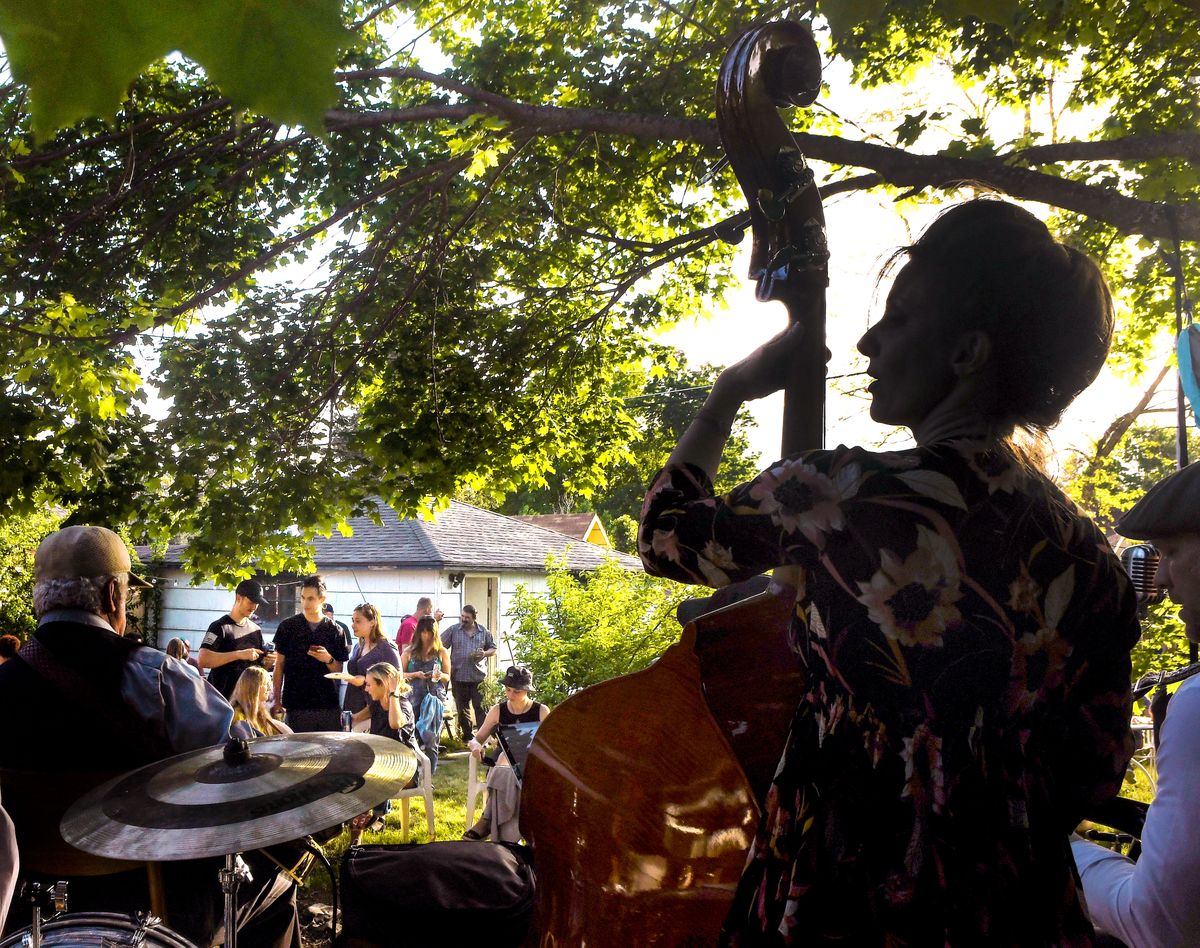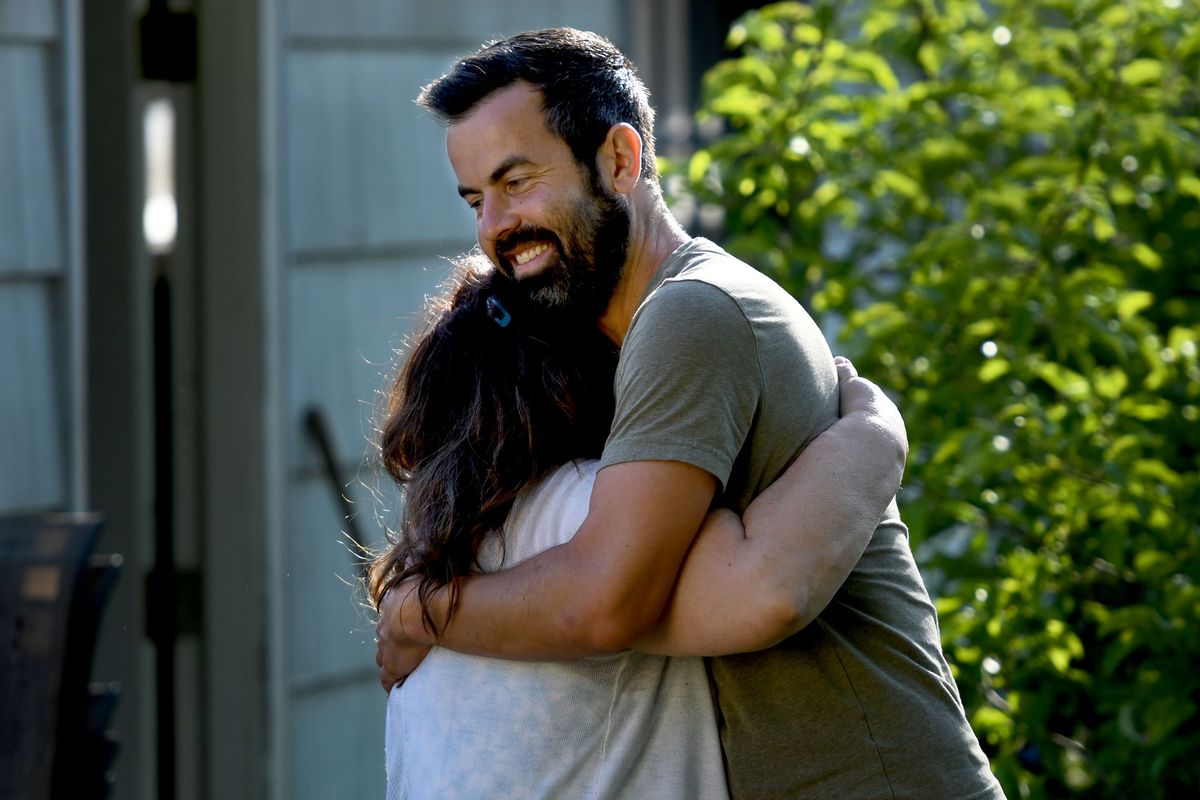‘Everyone needs an Adam in your life’: Informal invitations to Coeur d’Alene Monday night dinners lead to friendships

As Monday’s warm evening lingered, guests steadily entered the backyard of a small Craftsman home in midtown Coeur d’Alene. They brought drinks, deli dishes and homemade treats to set on a potluck table.
Kids explored a climbing wall. In one corner of the yard, a jazz band played soft tunes while people chatted. Any passersby on Third Street might guess this to be a family reunion or birthday party, except a majority of the more than 50 people there had only just met.
Shortly after 6 p.m., host Adam Schlüter welcomed them, asking how many first-timers came to what he calls Monday night dinners, held every other week during warmer months. One-third or more of them raised their hands, much to Schlüter’s delight.
“When I moved here, I didn’t know anyone, and I was going through stuff in my life,” Schlüter, 35, said. As loneliness crept in, he made a decision. “I walked around inviting everyone I met to come to these dinners.”
“I remember thinking, ‘What if no one shows up?’ At the first one, 11 came, and we just never stopped. That was maybe three years ago now, and at the last one, we had 80 people. It’s about making sure we get together and spend time together – no phones – just making connections.”
The Monday night dinners are rooted in a tradition started by his mom back when a college-aged Schlüter and his siblings in St. Louis were entering adulthood. She simply invited them back to a regular Monday dinner to stay connected.

Among his guests Monday, many of them described Schlüter as a common denominator. He’d asked them there, or someone who knows him did. His guests follow Schlüter’s few rules: Avoid cellphones, business talk or anything divisive.
The only agenda is to relax, share food and visit. Everyone brings a side dish, bottle of wine or six-pack of beer. There’s always plenty. People pitch in a few dollars each toward the band.
While the pandemic canceled a year of Monday dinners, this past week marked a return. It was dinner No. 46, Schlüter said. In early days, he’d invite grocery clerks, bank tellers, business owners and people on the street.
“From there, I asked people to invite others they thought might be lonely or struggling, and everyone kept doing that.” Robin Tevis, 32, used to be a grocery manager at the Safeway near Schlüter’s home. She was there Monday.
“He’s a single guy, and he’d walk over multiple times a day for random household stuff like salt and pepper shakers, and when he did, he’d talk to us and started inviting us over to Monday night dinners,” Tevis said.
“I kept making excuses, but one day I got off early, and so he talked me into coming over. I’ve been coming ever since.” That was about two or three years ago. Now, she describes being good friends with Schlüter and his girlfriend, Lillie Springer. They’ll watch each other’s cats.
Schlüter, a photographer, moved here in 2015 after being sponsored by an outdoor company to travel from Mexico to Alaska to select a best place to live. His pick was Coeur d’Alene, he said, for its beauty and friendly residents. He and a woman he’d hoped to marry moved here, but then that relationship abruptly ended.
Falling into a depression and feeling like he knew no one here, he turned to photography, travel and a sponsorship from Eurorail with an unlimited pass to take photos of places and people he encountered.
The work eventually led him to his project, Hello From a Stranger. He also does wedding photography through his Lightcast Photography. “I go all over the world and say hello to strangers, introduce myself, ask for their photograph, then put my camera away and try to have a general conversation,” he said.
“I’m an introvert, and it scares me all the time to do this, but I wanted to show people that you could go out, leave your comfort zone and introduce yourself to strangers, and, in that vulnerability, there’s tremendous connection that comes from it.”
It’s often easier to tell a stranger who is willing to listen what might be difficult to share with friends, especially if that stranger shows they’re vulnerable, too, he said. He started to think more about the growing loss of in-person connections against the rise of cellphones and social media. “I don’t like technology,” he said.
“I’m a little old-fashioned, and I’ve lost some very close friends to suicide. When I really started seeing the isolation in our culture that came from too much technology, too much phones, too much social media, I became very concerned with what was happening to connections between people.”
His focus on connections also fits well with Monday night dinners. This past week’s event was a first one for Annetta Willey, 57, who drove from Deer Park to be there. She met Schlüter a year and half ago on a chance encounter when she wandered into Art Spirit Gallery. Schlüter was the featured artist.
“I was looking at these gorgeous photos, and it felt like I could walk into them, so I was complimenting the photographer, not even knowing he was walking around,” she said. They talked and connected. She began following his photographing adventures on Facebook. They’ve stayed in touch.
“Adam is just amazing because he sees the person’s heart,” Willey said. “He doesn’t see the outside. He’s seen me. He’s about the only person in my entire life who has been an inspiration to me.”
She said getting to know Schlüter has inspired how she responds at work as a scheduler for the Mann-Grandstaff VA Medical Center’s behavioral health services. Some people who call into her work sound angry, so she tries to think about the individual.
“There are a lot of veterans who face a lot of crises due to their experiences with the wars, and they need that extra love like what Adam has – a soft ear, not a hard ear,” she said. “I think if we did that with everyone, personally, it would make a huge difference.”
“That’s why Adam and I connect so much, the heart-to-heart, instead of what people look like on the outside. I know it’s God-driven because I have a friend for life and one who will challenge me on my bucket list.”
She didn’t have a bucket list until Schlüter challenged her. “I want to go whale-watching,” she said. “I want to go to Vienna and see the Lipizzaner stallions and their castle. He’s pretty awesome. Everyone needs an Adam in your life.”
Schlüter said that with his book, “The World I See,” he tries to inspire people to put phones away, turn off televisions and “see how beautiful the world naturally is.” Near the start of Hello From a Stranger, Schlüter had lost his best friend to suicide. Over time, four other people in his life have died from suicide.
“I won’t place all the blame on phones or social media, but the blame that I have to put with that was our inability to talk about vulnerability and to talk about emotions and things that really require in-person communication, to talk through struggles,” he said.
“I think people are better understanding that we’re losing that in-person connection we used to have, and we’re starting to see the repercussions from that.” In meeting strangers in different cities, he went from a rejection rate of 90% to now less than 5%, he said, just from asking questions and being interested.
“There’s nothing special about me. I’m not a great speaker. I get nervous when I approach someone every single time,” he said. “I just learned that vulnerability illustrates genuine nature, and in that genuine nature, we trust.
“I have conversations with strangers who are incredibly emotional and personal within just a couple of minutes.” Among the strangers he photographs, he gives them a card to email and get the picture for free. A majority stay in touch.
For Monday dinners, there’s a wide range of ages. They include Jack Wade, 22, a Coeur d’Alene videographer who has traveled with Schlüter for Hello From a Stranger work. Wade credits Schlüter for teaching him more about people than about photography. They met at an innovation center in Coeur d’Alene.
“I met him when I was 17,” said Wade, also a U.S. Marine Corps reservist. They reconnected after he returned from boot camp and “felt kind of like a robot.” Schlüter helped him launch a career in video work, but their friendship also deepened.
“Adam’s been someone I can turn to no matter what the situation. I’ve gone to him for some of my lowest lows; he’s always listened. Not only has he been that for me, he’s shown me how to be that way for others and how just to be present and be genuine.
“When you’re genuine, people pick up on that and open up. Sometimes, that’s all the other person needs is for someone to genuinely listen, look in their eyes and understand. They don’t feel so alone.”
Schlüter still visits his parents regularly in St. Louis, making it to some of his mom’s continuing Monday night dinners. He’s heard of people in other cities who learned about his dinners and are duplicating them. His friends have hosted ones in town if he has to travel.
He said he feels blessed with being able to connect with people. Deep conversations can sometimes feel overwhelming, but he doesn’t want to lose touch with anyone. A recent friend lost to suicide was at a Monday dinner during summer 2019 and died the next day. That still weighs on Schlüter. He continues to share a message for each person to pursue in-person connections as he did again on Monday.
“This past year was difficult, and we were more disconnected than ever. I think we all lost ourselves a little bit, and, if nothing else, it rejuvenated the need more so to bring people together. We all have this same potential to bring people together, to pay attention to people, to listen to people, to check in with people.”